Natural Home Remedies for Tooth Decay
By Dr Ashok Pal +2 more

Get,

to manage your symptom
Get your,


4 Cr+ families
benefitted

OTP sent to 9988776655



You’ve successfully subscribed to receive
doctor-approved tips on
Whatsapp

Get ready to feel your best.

Hi There,
Download the PharmEasy App now!!


Register to Avail the Offer
Send OTPBy continuing, you agree with our Privacy Policy and Terms and Conditions

Hi There,
Sign up on PharmEasy now!!
Trusted by 4 crore+ families

OTP sent to 9988776655



You have unlocked 25% off on medicines




Code: NU25
By Dr Ashok Pal +2 more
Table of Contents
Have you noticed small, black holes in your teeth? Did you dismiss them as just stains? They may not be just stains; they can be early signs of tooth decay. Since childhood, we have been told not to eat sweets and chocolates, as they may destroy our teeth. The bacteria in our mouth use the sugar and starch from our food to produce acid that destroys the tooth. The small spot can turn into a big hole in no time, cause pain, and if it is not treated in time, you might even lose your tooth1. This decay is commonly referred to as cavities, also known as dental caries. You can prevent cavities by brushing and flossing your teeth properly2.
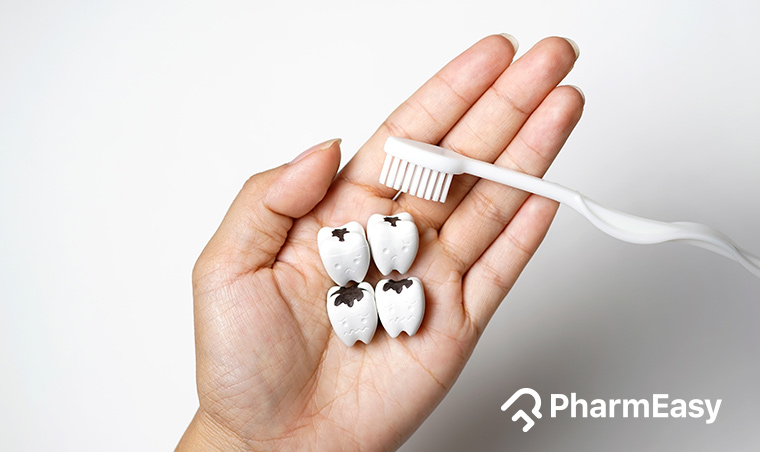
There are plenty of bacteria in the mouth, some are helpful to us, and others cause harm. These harmful bacteria are responsible for the decay of teeth. The bacteria together form a film (plaque) and participate in making acid from the food that you eat, mainly from sugars and starches. This acid forms and damages the teeth, which we see as decay. As part of a natural process, our teeth keep losing and regaining minerals. If we do not care for our teeth properly, it results in the loss of more minerals than we can regain, thus leading to tooth decay1.
There are a few signs that you should look out for if you think that you have tooth decay. The symptoms of tooth decay are:
The best way to avoid the decay of teeth is to take care of them by maintaining proper oral hygiene. All the remedies suggested here are to maintain oral health and prevent the formation of cavities. The following are a few home remedies for better and healthier teeth.

Oil pulling is an Ayurvedic procedure that helps maintain oral hygiene. In one of the many studies conducted, it was seen that oil pulling reduces the number of bacteria in the mouth and decreases plaque formation, which might prevent tooth decay in the long run. In this procedure, a small amount of coconut oil, sesame oil, or sunflower oil, in its pure form (preferably cold-pressed), is used to swish around the mouth, ensuring that all the teeth are covered. This procedure is to be done in the morning on an empty stomach before brushing your teeth3. There is a need for more research regarding the benefits of oil pulling; nonetheless, it is being used.
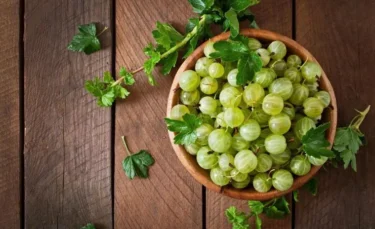
Amla is a herb that is commonly used in Ayurveda. It is a fruit and can be used in the form of a decoction and for rinsing the mouth, as it is generally known to be good for oral health. Not only that, we can consume a little bit of amla daily to reap its long-term benefits for teeth4. As amla helps maintain healthy teeth, it may also be beneficial in preventing tooth decay.
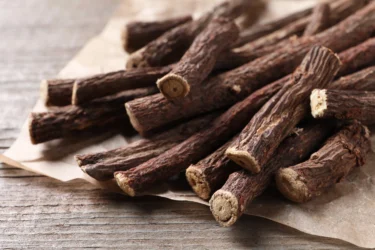
Liquorice is also called the ‘sweet herb’, Yashtimadhu (Sanskrit), or mulethi. In recent years, researchers have been extensively studying the benefits of liquorice. In one such study5 conducted, it was found that liquorice contains bioactive compounds that are effective in destroying the bacteria Streptococcus mutans or S. mutans, responsible for causing tooth decay. Therefore, liquorice may prevent the decay of the tooth. Furthermore, we can chew the root of liquorice to protect our teeth from cavities.
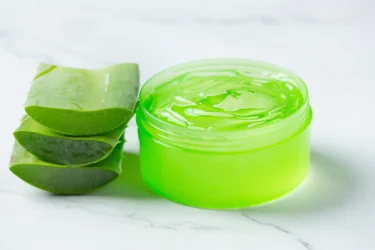
Aloe vera gel has a wide range of uses. It has anti-microbial (germ-killing) and anti-inflammatory (inflammation-reducing) properties due to the presence of bioactive compounds. A study6 has shown that aloe vera gel effectively kills and removes bacteria (S. mutans and Lactobacillus spp.), which are known for their involvement in cavity formation (dental caries). In this way, aloe vera gel might protect the tooth from decay. It can be used by making juice and drinking it daily. It can also be used as a toothpaste to brush teeth daily to receive its benefits.
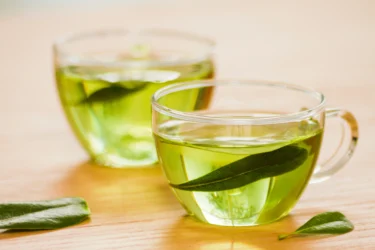
Green tea has anti-bacterial properties; thus, it is said to lower the number of bacteria in the mouth that have the potential to cause cavities. It also contains a high amount of fluoride. Fluoride is a mineral that protects teeth from decay by helping them to regain minerals. Researchers8 have found that green tea prevents caries (anti-cariogenic) in animal models. It might be because of its anti-bacterial activity due to the presence of certain substances. Studies in humans have been inconclusive; hence, further research is needed to conclude. You can consume green tea as a beverage by using its leaves or a teabag to brew a hot cup of green tea.
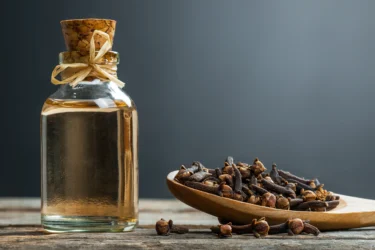
An experiment was conducted to understand the effect of clove oil on tooth decay by preventing decalcification (loss of minerals from teeth). In this experiment, it was found that clove oil-treated teeth showed less mineral loss when subjected to acids, which can destroy teeth. Its action might be similar to that of fluoride in preventing tooth decay7. Further studies need to be conducted to prove its use as a tooth decay-preventing agent in humans. Clove oil is a common component of many kinds of toothpaste. You can use it by mixing a little clove oil in your toothpaste and brushing your teeth using this paste twice daily.
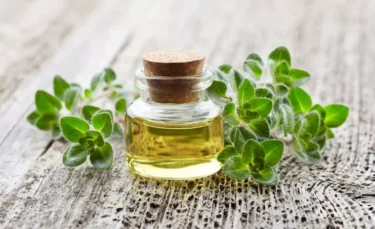
Oregano oil is an essential oil. It has the property of destroying various microorganisms like bacteria, fungi, etc. Therefore, its potential to kill tooth-decaying bacteria was evaluated in a study. This study9 showed that when oregano oil was added to a toothpaste, which was already efficient in killing bacteria, its efficiency increased twofold. Thus, it helps in the prevention of tooth decay. You can mix oregano oil with your regular toothpaste and use it to brush your teeth daily.
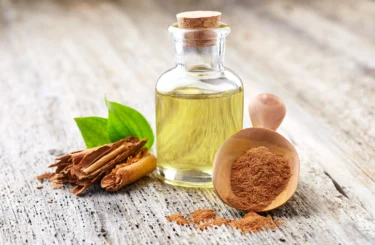
In the same study9 mentioned above, the activity of the oil from one of the cinnamon species, Cinnamomum cassia (Chinese cinnamon), was also studied. The bacteria-destroying activity of cinnamon oil was evident. Thus, cinnamon oil might be used in the prevention of dental cavities. You can make use of this oil in the same way by mixing it in toothpaste and brushing your teeth daily.
Also Read: Simple Home Remedies for Swollen Gums
You should seek help from a dentist if:
Also Read: Simple Tips You Can Follow for Heartburn Relief!
The best way to protect your teeth from getting damaged due to tooth decay is to keep them clean. Cavities can occur when the bacteria present in your mouth use the food particles left behind from improper cleaning to make acid, which damages the teeth. You might see a cavity and experience sensitivity and pain. Sometimes, there can also be an infection of the teeth and mouth. You can prevent the formation of cavities by the use of a few home remedies, such as oil pulling, clove oil, aloe vera gel, and green tea. However, if you have a cavity, pain, or swelling, notice signs of infection, experience bleeding from gums, or have difficulty chewing, you should pay a visit to your dentist. Prevention is always better than a cure, and you can do it by simply following proper oral hygiene. So, let us make sure that we can take care of our teeth and protect them from decay.
Also Read: Simple Home Remedies For Dry Throat
No, black holes in your teeth may be tooth decay. Consult your dentist to be sure.
No, tooth brushing cannot help your decay go away. However, it can prevent tooth decay.
Yes, in many studies9, clove oil was found to have similar effects to fluoride in preventing tooth decay. Further research is required to be sure of it.
Yes, green tea has high fluoride content and anti-bacterial properties, both of which are known to be beneficial in preventing tooth decay.
1. National Institute of Dental and Craniofacial Research. Tooth decay [Internet]. Bethesda (MD): National Institute of Dental and Craniofacial Research; [cited 2025 May 28]. Available from: https://www.nidcr.nih.gov/health-info/tooth-decay
2.Centers for Disease Control and Prevention. About cavities (tooth decay) [Internet]. Atlanta (GA): Centers for Disease Control and Prevention; 2024 May 15 [cited 2025 May 28]. Available from: https://www.cdc.gov/oral-health/about/cavities-tooth-decay.html
3. Shanbhag VKL. Oil pulling for maintaining oral hygiene – A review. J Tradit Complement Med [Internet]. 2017 Jan [cited 2022 May 26];7(1):106-9. Available from: http://dx.doi.org/10.1016/j.jtcme.2016.05.004
4. Singh A, Purohit B. Tooth brushing, oil pulling and tissue regeneration: A review of holistic approaches to oral health. J Ayurveda Integr Med [Internet]. 2011 Apr [cited 2022 May 26];2(2):64-8. Available from: https://www.ncbi.nlm.nih.gov/pmc/articles/PMC3131773/pdf/JAIM-2-64.pdf
5. Sidhu P, Shankargouda S, Rath A, Ramamurthy PH, Fernandes B, Singh AK. Therapeutic benefits of liquorice in dentistry. J Ayurveda Integr Med [Internet]. 2020 Oct [cited 2022 May 26];11(1):82-8. Available from: https://www.ncbi.nlm.nih.gov/pmc/articles/PMC7125382/pdf/main.pdf
6. Bałan BJ, Niemcewicz M, Kocik J, Jung L, Skopińska-Różewska E, Skopiński P. Oral administration of Aloe vera gel, anti-microbial and anti-inflammatory herbal remedy, stimulates cell-mediated immunity and antibody production in a mouse model. Cent Eur J Immunol. 2014 Jun 27;39(2):125–130. doi:10.5114/ceji.2014.43711. PMID: 26155113; PMCID: PMC4440021. Available from: https://www.ncbi.nlm.nih.gov/pmc/articles/PMC4440021/
7. Marya CM, Satija G, Avinash J, Nagpal R, Kapoor R, Ahmad A. In Vitro Inhibitory Effect of Clove Essential Oil and Its Two Active Principles on Tooth Decalcification by Apple Juice. Int J Dent [Internet]. 2012 May [cited 2022 May 26];2012:759618. Available from: https://www.ncbi.nlm.nih.gov/pmc/articles/PMC3432374/pdf/IJD2012-759618.pdf
8. Melok AL, Lee LH, Mohamed Yussof SA, Chu T. Green tea polyphenol epigallocatechin-3-gallate-stearate inhibits the growth of Streptococcus mutans: a promising new approach in caries prevention. Dent J (Basel). 2018 Aug 6;6(3):38. doi:10.3390/dj6030038. PMID: 30082585; PMCID: PMC6162448. Available from: https://www.ncbi.nlm.nih.gov/pmc/articles/PMC6162448/
9. de Oliveira Carvalho I, Purgato GA, Píccolo MS, Pizziolo VR, Coelho RR, Diaz-Muñoz G, Alves Nogueira Diaz M. In vitro anticariogenic and antibiofilm activities of toothpastes formulated with essential oils. Arch Oral Biol. 2020 Sep;117:104834. doi:10.1016/j.archoralbio.2020.104834. PMID: 32663696. Available from: https://pubmed.ncbi.nlm.nih.gov/32663696/
Disclaimer: The information provided here is for educational/awareness purposes only and is not intended to be a substitute for medical treatment by a healthcare professional and should not be relied upon to diagnose or treat any medical condition. The reader should consult a registered medical practitioner to determine the appropriateness of the information and before consuming any medication. PharmEasy does not provide any guarantee or warranty (express or implied) regarding the accuracy, adequacy, completeness, legality, reliability or usefulness of the information; and disclaims any liability arising thereof.
Comments

Leave your comment...
You may also like
Comments